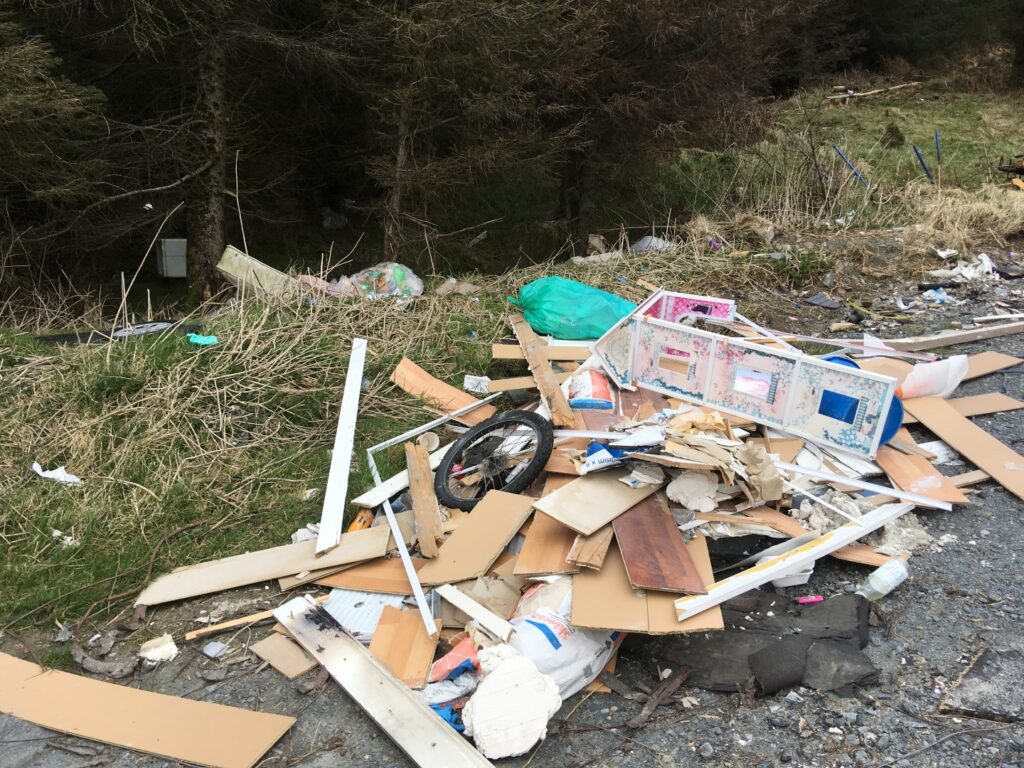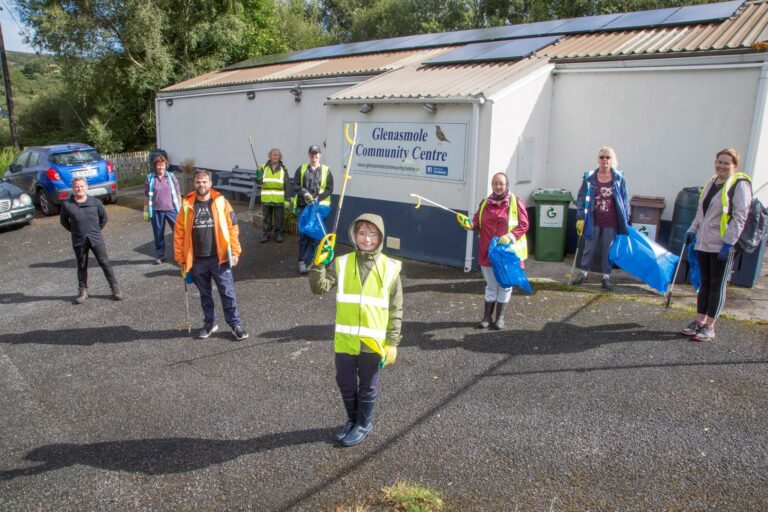In 2020 the Pure Project removed over 750 individual dumping sites, with the collection of over 140,000kg (140 tonnes) of illegally dumped waste from the remote, beautiful, and scenic Wicklow/Dublin Uplands, which was a 50% reduction compared to ten years previous, when in 2010 Pure removed 282,000kg (282 tonnes). The Pure Truck is on the road every day, and since the project was established, Pure has collected over 3,500,000kg (3,500 tonnes) of rubbish from over 12,500 illegal dumping sites in the Wicklow/Dublin Uplands with the project processing over 13,500 reports. If you were to put all the rubbish that Pure has removed from the uplands into standard household rubbish bags, they would fill over 400,000 bags. If you lined up all these bags on the road, they would stretch all the way from Dublin to Dingle. The start of 2021 was a busy period for the Pure Project, with the Pure Truck removing 3,000kg (3 tonnes) of waste on a weekly basis, resulting in the collection of 12,000kg (12 tonnes) of illegal dumping from the Wicklow/Dublin Uplands for the month of January.

Ian Davis, Pure Manager, commented, ‘Illegal dumping is not unique to the Wicklow/Dublin uplands, however, while most regions in Ireland are currently reporting an increase in illegal dumping, the Pure Project is seeing a decrease’.
The environmental project has been recording and mapping every location and incident of illegal dumping in the Wicklow/Dublin Uplands since 2007 and have built up a base-line-data of all illegal dumping activity in this region, the location of dumping, type of dumping, landowner, and amount of dumping, and for a number of years now they have been recording an annual reduction. The data that Pure collect is valuable information providing indicators into the nature and extent of illegal dumping in Wicklow/Dublin Uplands, and statistical evidence for all illegal dumping incidents in this region. Although Pure are recording a reduction in dumping, they are concerned about recent large-scale incidents of illegal dumping in the uplands, which may be an indication of a return to the bad old days, when Pure was removing over 400 tonnes of rubbish annually.
Ian Davis, further added, ‘The Pure Project has made huge progress in reducing illegal dumping in the Wicklow/Dublin Uplands. If you compare the amount of dumping we collected in 2020, which was 140 tonnes of waste, to 2008 which was our busiest year, when we removed 440 tonnes, we’ve seen a 68% reduction. However, it is extremely important that we do not become complacent, because if we do, it won’t take long before dumping will be on the increase.’
Pure utilises a multi-disciplined approach in combating illegal dumping, incorporating a number of educational initiatives, environment/community projects – The Pure Mile, public awareness campaigns, regional/national media campaigns, enforcement and preventative measures, GPS/GIS data-base to record all illegal dumping sites, covert CCTV operations, and a dedicated vehicle – The Pure Truck, that removes all illegal dumping from the Wicklow/Dublin Uplands. The Pure Project Partnership approach, incorporating statutory, non-statutory organisations, and members of the public, has proven extremely successful in combating illegal dumping in the Wicklow/Dublin Uplands and over the past four years they have recorded an annual reduction in illegal dumping activity. This reduction in dumping coincides with the huge increase of Pure Mile groups and areas, with hundreds of miles of roads, mountains, woodlands, valleys, forestries, upland amenities, car parks, and beaches, currently being adopted.
The PureMile Project is an environmental, community, heritage initiative, that encourages communities and groups living in rural areas of South Dublin, Wicklow, and Dun-Laoghaire, to adopt a mile of road, or miles of road, in their local area, or in the Wicklow/Dublin Uplands and organise litter picks, clean-ups, anti-dumping campaigns, research information about their local wildflowers, plants, trees, animals, and the built, cultural, and social heritage of an area. Thousands of PureMile volunteers, ranging from individuals, family groups, community groups, walking groups, cycling groups, scouts, beavers, businesses, and organisations, have removed hundreds of tonnes of illegally dumped waste and thousands of bags of litter and rubbish from the Wicklow/Dublin Uplands. Pure provide all groups with Pure Mile signage, Pure Mile bags, gloves, litter pickers and Pure Mile high-vis vests, and they also remove all of the rubbish collected by the groups.
In 2020, the introduction of Covid-19 travel restrictions and guidelines, prohibited the Pure Mile from organising their numerous clean ups and litter picks of the South Dublin Uplands, which resulted in a visible increase of litter in this scenic area. Past clean-up events carried out by Pure Mile Groups resulted in the removal of hundreds of bags of litter and rubbish, and it further demonstrates the necessity and importance of The Pure Mile Project, and the need for continued collaboration and engagement to protect the South Dublin upland environment. 2020 also saw a large increase of visitors to the Wicklow/Dublin Uplands, with day-trippers attracted to remote, secluded, scenic, mountainous, and wooded areas. Unfortunately, abandoned campaign sites were prevalent and the material removed by Pure, included, hundreds of tents, sleeping bags, blankets, chairs, tables, food items, bottles, cans, and barbeques, all discarded on the landscape.
Another initiative attributed to the annual decline in illegal dumping activity is the success of the Pure Covert CCTV Operations, which involved the deployment and installation of a number of covert CCTV units at several problematic upland dumping sites which were continually affected by illegal dumping. A number of illegal dumping incidents caught on covert CCTV are currently under investigation by Wicklow County Council, and South Dublin County Council, and Pure are confident that both of the local authorities will proceed with court prosecutions.
Pure is the first project of its kind in Ireland and works with a number of statutory and non-statutory organisations and stakeholders, including, The Department of Environment, Climate, and Communications, Wicklow County Council, South Dublin County Council, Dun Laoghaire Rathdown County Council, Coillte, National Parks & Wildlife Service, and the Wicklow Uplands Council. This unique partnership project was established to combat illegal dumping in the Wicklow/Dublin Uplands and was officially launched in September 2006.
TO REPORT DUMPERS AND DUMPING lo–call 1850 365 121


